With Buddhist Roots, Recovery Cafes Spread Across Northwest, Helping People with Addiction
Written by: Emily Neilson
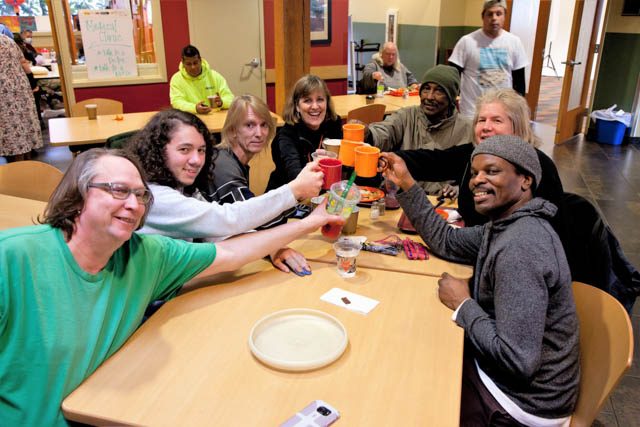
Recovery Café members take a break from their game to cheer recovery!
Photos by: John Jensen, Jeff King, Peter Yates.
Seattle’s Recovery Café Network is steadily growing in the Northwest, as it taps Buddhist and other sources to offer help for people with addiction issues.
In addition to our flagship program in Seattle, 11 Recovery Cafes have now opened their doors.
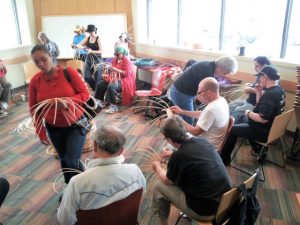
Members engage in basket weaving, a class offered through the School for Recovery.
In 2018 we are opening three more in the Pacific Northwest. Recovery Café Clark County, in a mostly rural county south of Seattle closer to Portland, opened in July. This café grew out of advocacy coalition as a response for additional recovery services needed in their area.
Our 11th café will open this fall in Orting Valley, a small town south of Puyallup, which is south of Seattle. This grassroots effort developed after the community lost several high school students to drug overdoses in a short period.
Also opening this fall is a café called “Reclaiming Lives,” in Medford, Oregon, the first outside Washington state. It also grew out of needs in the Medford community.
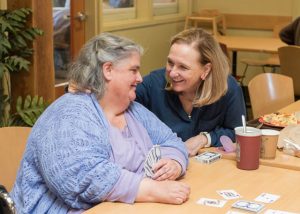
Recovery Café Co-Founder Killian Noe shares a moment with a member during a card game.
In 2017 we opened a Spokane café, preceded by a Tacoma café in 2016 and an Everett café in 2015.
The plan is to establish cafés in the more densely populated cities with strong -in-kind partnership opportunities. As these programs develop we are moving into more rural areas. We’re still developing ways to document how many people have been served.
The Recovery Café Network was formed after our third café in 2016, and every member of the network is now dedicated to these core commitments:
– Creating a milieu that is drug and alcohol-free, embracing, healthy and healing.
– Empowering every member of the community to be a contributor.
– Nurturing structures of loving accountability called Recovery Circles.
– Ensuring responsible stewardship.
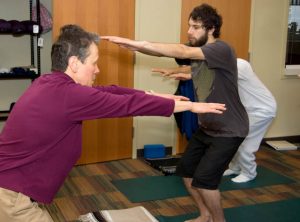
Café members in our Yoga Instructor Training Program.
The Recovery Café Network comes from a nationwide need for long-term addiction recovery support. America is in the midst of an addiction crisis from opioids to alcohol.
Many establishments claim to treat addiction, but the truth is many don’t. One in 10 American adults are addicted to drugs and/or alcohol, and only 11 percent receive treatment. Furthermore, crisis treatment is better funded and more available than long-term support, the kind of support the cafés provide.
The Recovery Café Network originated from our flagship recovery center in Seattle. We are a supportive community of about 1,000 people, a combination of members, staff, directors and donors, all seekers who believe we are all in recovery and that we all belong to each other. We are long-term and holistic in our approach.
Though our roots are Christian, we welcome and practice many of the great, love-based faith traditions from Bahá’í to Buddhism.
Many of our members might not know it, but Buddhist philosophy is an integral part of the cafés. Those of us who practice Buddhism are in the habit of translating words like “community” to “sangha,” and “curriculum” to “dharma.”
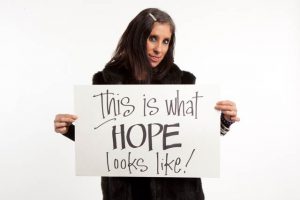
Recovery Café member April shares her expression of hope during the café’s annual Portrait Day.
Inside the Seattle facility a poster-size portrait of the Dalai Lama hangs next to posters of Martin Luther King and Mahatma Gandhi. A modern-day Jesus, who frankly looks more like Bob Marley, is opposite them. The people in these photographs embodied the way of love we all seek to embody.
Buddhist philosophy is rooted in addiction recovery. The pillars of Buddhism are the four noble truths which state we are all suffering from attachment and desire. The eightfold path is the way out. Though we don’t refer to it as such, members of Recovery Café’s community are working this path day in and day out.
Unconditional acceptance is offered to all who enter including those of us with upsetting pasts, or who have committed unspeakable crimes. Staff and volunteers model kindness and compassion. They are mindful of their words and their actions.
Meditation and yoga classes are taught as well as Buddhist philosophy. Before each meal or board meeting, we do a quick meditation to center ourselves and make sure we are coming from a grounded place of love.
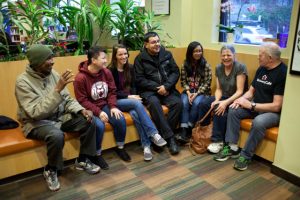
Recovery Café members Abdi, French, and Mike, staff member Bea Cabrera, and volunteers from the University of Washington, sharing jokes in the café.
Founded in 2004, Seattle’s flagship Recovery Café is currently located in a historic building in downtown. The one-floor space is bright and open, with a barista stand in the middle. A person entering is greeted by smiling staff members. To the left of the entry is a large center island, where we serve lunch and dinner buffet-style.
To the right is a living room with computers and a small bookshelf lined with fiction paperbacks, self-help books and board games. Dining tables for two to 10 fill the rest of the space. On average up to 150 members, staff and volunteers can be seen in this space chatting, playing chess, eating, reading, writing or feeling safe over a warm latte.
Lining this community space are four meeting rooms and several staff offices, all of which have big glass windows so everyone can see in and out. Recovery circles meet, staff members type and therapists counsel, all in full view.
The café reflects the founders’ belief that beauty, light and openness are essential to healing and transformation. They believe everything in the space should say “your life matters,” to those who enter.
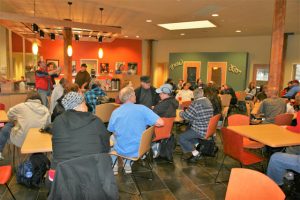
Recovery Café Senior Floor Manager Darren Kilian makes announcements, after the café’s daily five minutes of meditative silence.
Evaluating the success of recovery treatment is challenging. The Recovery Cafe uses metrics, member feedback and word-of-mouth. The success of this has attracted many other non-profits and faith-based organizations, which have asked for support and guidance in setting up their own recovery centers.
We were hesitant about how to respond at first, because we weren’t sure how to replicate ourselves. It’s hard to franchise spirit. After deliberation we decided if we could establish personal connection, create training programs and provide continual open communication and support, it was worth trying.
Taken directly from the RNC’s website: “The collective impact of many organizations working together, learning together and sharing resources, creates a synergy and ripple-effect of lives transformed. Through this joint approach, we all have a broader and deeper reach than any group working on its own.”
Please come visit our café on 2022 Boren Ave. in downtown Seattle, to get a feel of where recovery is headed. The latte is on us.
